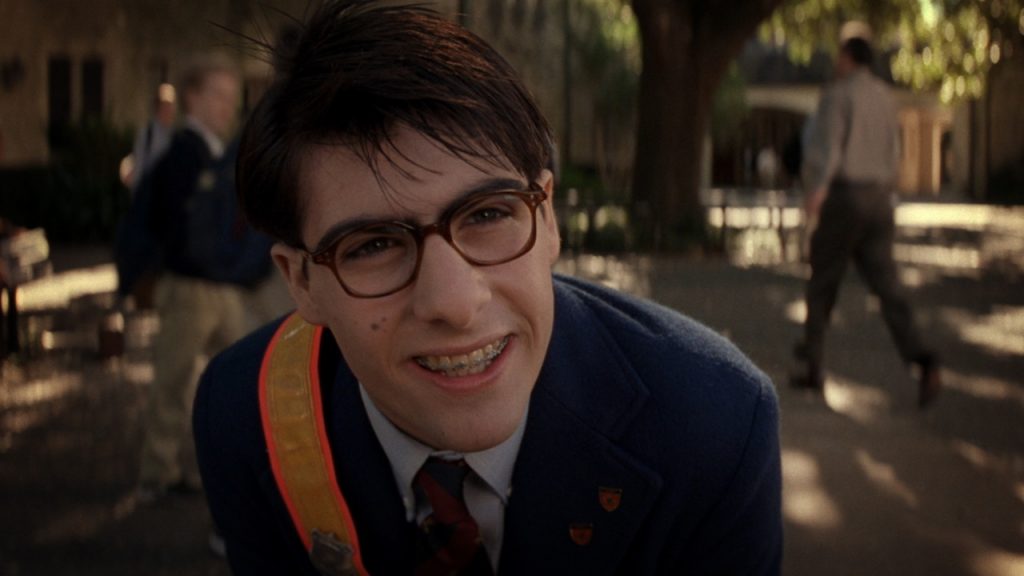Coming of Age, by Bob Connally
26 Apr
Wes Anderson’s films are often most memorable for the little moments. He can find the humor and the sadness in the smallest gestures and inflections. His detractors feel that his films tend to be too crafted and controlled. That he gets too caught up in set and costume design and loses focus on characters. While I feel that some of his films (this one, The Royal Tenenbaums, The Grand Budapest Hotel) are more effective than others (The Darjeeling Limited, Moonrise Kingdom), all eight of his features have ranged from pretty good to exceptional. A lot of little things add up in all of them. Still, 17 years after I first saw it (just weeks after I graduated high school), Rushmore stands as my favorite.
Anderson’s second movie has a fascinating place in his filmography looking at it now, because it’s unique both from his debut Bottle Rocket and everything that has followed. Bottle Rocket was a movie about a group of oddballs in a world that feels like our own. Each film from The Royal Tenenbaums (his third movie) on has been in a world that has felt completely crafted from the bottom up. The characters in those movies inhabit worlds that were created by Anderson just for them. Rushmore stands out though. Its hero, Max Fischer (Jason Schwartzman) is in a world that feels mostly recognizable to ours but Anderson has a way of making us see it both through Max’s eyes as well as our own. Max sees it in a way that is unique while he also tries to shape it the way he wishes it could be. It’d be hard not to see Max as a stand-in for a young Anderson. If I had to guess I would feel very confident in saying that this is his most personal film. For me, even after countless viewings it is still also his funniest.
Again, it comes down to so many little things. How Max holds up the Jacques Costeau book next to his face when he says, “I have an overdue library book to return,” or how Bill Murray is somehow able to make the sight of a man eating a carrot funny. These things work so well though because of the tone that Anderson and co-writer Owen Wilson establish from the beginning.
Rushmore is the story of Max Fischer, a 15-year old student at Rushmore Academy who spends so much time and energy starting clubs and writing and directing absurdly ambitious school plays that he is failing all of his classes. Unlike the majority of his classmates, Max does not come from a wealthy family. He’d gotten a scholarship in second grade when, shortly before she died, his mother submitted a play to the school that Max had written. “A little one act about Watergate” (a line that always kills me). If he doesn’t pick his grades up however, Dr. Guggenheim (Brian Cox) will have no choice but to expel him. Max is quickly distracted again however by a friendship he starts up with local millionaire Herman Blume (Murray) whose twin sons are in Max’s grade and his crush on one of the school’s elementary school teachers, Rosemary Cross (Olivia Williams, The Sixth Sense).
This movie is a 93-minute long coming of age story so it’s natural for a lot of people to view Rushmore as slight. I can understand that take, but to me it’s so much more than that. This and American Graffiti are the movies I point to that show how momentous little moments in our youth can feel as we’re experiencing them. It’s a movie that captures that sense of optimism balanced with apprehension about what could lie ahead and how those feelings constantly wrestle inside of us.
The performances are wonderful from top to bottom. Schwartzman is hilarious and endearing as a character that in most high school movies would be off to the side and probably be a subject of ridicule for the filmmaker. Max can be self-serving, he can be a jerk, he can even cut Herman’s brakes in an escalating war over Miss Cross, but he never loses us at any point through the film. We never lose sight of a kid with a heart that is bursting at the seams even if he doesn’t understand how to properly channel that. He is after all, a 15-year old. So he tries to channel it in about seventeen directions at once.
Murray gives arguably the finest performance of his career. His transition from young wisenheimer in films such as Stripes and Ghostbusters to melancholy middle-aged man is complete here. He conveys the deep sense of sadness and regret within Herman in a way that connects with us emotionally while still being funny. This is the performance that began a new phase in Murray’s career and showed that he could do what so many of his Saturday Night Live contemporaries could not. He could play characters above the age of forty who act like they’re above the age of forty. The rest of the cast is utterly perfect, from Williams to Cox to Seymour Cassel (Max’s dad) to young Mason Gamble as Max’s chapel partner.
Rushmore is a film full of character and characters. Every frame of this beautifully shot and composed movie is a feast for the eyes and no matter how many times I see it, this film always makes me laugh.
For a companion film, I’ll go with the other movie my friends and I rented that day all of those years ago. Alexander Payne’s Election, which is like a cynical cousin to this one. For that reason, I would recommend watching Election first, then Rushmore afterwards for its more upbeat nature.




No comments yet